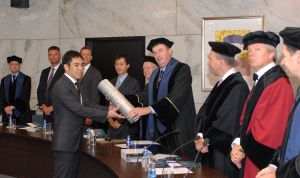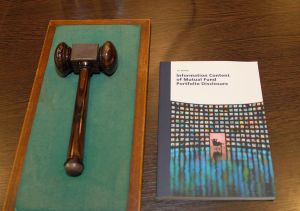Information Content of Mutual Fund Portfolio Disclosure
Mutual funds have been among the largest investors in the U.S. economy and world financial markets for the past 20 years. Where does the enormous appeal of mutual funds among investors come from? Do actively managed portfolios add value? Academics have debated these issues for many years. The majority of the studies have reached a consensus that actively managed funds, on average, underperform their passive benchmarks after transactions costs and fund expenses.
In his thesis entitled Information Content of Mutual Fund Portfolio Disclosure, Yu Wang attempts to solve the performance puzzle by looking at the performance of stocks held by mutual funds. The quarterly mutual fund holdings data allow a more comprehensive look at the value of active asset management at the security level. With this database, Wang empirically examines the information content of mutual fund portfolio holdings.
The main findings are based on practically implementable stock investment strategies, which suggest ways for individual investors to benefit from exploiting active funds’ portfolio holdings. The thesis further provides insight into the informational role that active fund managers play in financial markets.
Yu Wang defended his dissertation on September 9 2011. His promoter was <link people marno-verbeek _blank>Prof.dr. M.J.C.M Verbeek. His co-promoter was Dr. H. Jiang. Other member of the Doctoral Committee were Prof.dr. W.F.C Verschoor, Dr. R. Wermers, and Dr. M.A. van Dijk.
About Yu Wang
 Yu Wang (Tianjin, 1982) joined the Department of Finance at Rotterdam School of Management of Erasmus University and the ERIM PhD program in September 2008. Before that, he held a BSc degree in Finance and Economics (Nanjing University, 2004) and an MPhil degree in Finance from Erasmus Research Institute of Management of Erasmus University. In 2007, he did an investment banking summer internship with the Quantitative Analytics Department of ABN AMRO Global Markets. From June 2011, he works as a portfolio manager/researcher for an in-house hedge fund at IMC Asset Management in Amsterdam.
Yu Wang (Tianjin, 1982) joined the Department of Finance at Rotterdam School of Management of Erasmus University and the ERIM PhD program in September 2008. Before that, he held a BSc degree in Finance and Economics (Nanjing University, 2004) and an MPhil degree in Finance from Erasmus Research Institute of Management of Erasmus University. In 2007, he did an investment banking summer internship with the Quantitative Analytics Department of ABN AMRO Global Markets. From June 2011, he works as a portfolio manager/researcher for an in-house hedge fund at IMC Asset Management in Amsterdam.
Yu’s research interests include institutional investors, empirical asset pricing, investments, and behavioral finance. In particular, he is interested in understanding the information content of mutual fund portfolio disclosure and whether active mutual fund managers attain informational advantages in financial markets. His research works have been presented at several major finance conferences including Utah Winter Finance Conference, Eastern Finance Association Conference, Midwest Finance Association Conference, European Financial Management Association Conference, Financial Management Conferences (International and European), and Rotterdam Professional Asset Management Conference. His paper “Better than the Original? The Relative Success of Copycat Funds” received the Outstanding Paper in Investments award at the Eastern Finance Association Conference (Miami, April 2010). In December 2010, his project “Information Content when Mutual Funds Deviate from Benchmarks” received the INQUIRE Europe Research Grant (Institute for Quantitative Investment Research).
Abstract of Information Content of Mutual Fund Portfolio Disclosure
 Academic financial economists have been keenly interested in the value of active portfolio management since the seminal paper of Jensen (1968). This book examines the information advantages that active mutual fund managers attain in financial markets through an analysis of disclosed fund holdings. Performance evaluation at the security level allows us to paint a more comprehensive picture of fund managers’ security-selection talents. The three chapters in this book constitute an empirical investigation of the information content of mutual fund portfolio disclosure. Chapter 2 examines the value of active funds’ portfolio disclosure from an outside investor’s perspective. Hypothetical copycat funds that duplicate the disclosed asset holdings of actively managed funds can generate performance that is comparable their primitive targets. More interestingly, their relative success increases after the U.S. SEC mandates more frequent portfolio disclosure. Chapter 3 studies the information content of the active portion of fund investments by creating a stock-level measure that seeks to aggregate various pieces of information scattered among active funds, as revealed through their over- and underweighting decisions. Active funds’ portfolio deviations from benchmarks can strongly and positively predict future stock returns. The findings establish a robust link between active fund investments and asset prices. Chapter 4 further explores the role that active mutual funds play in bringing about price efficiency. Active funds are able benefit from fundamental analysis and their information advantages are mainly attributed to their expertise in forecasting and processing fundamental information.
Academic financial economists have been keenly interested in the value of active portfolio management since the seminal paper of Jensen (1968). This book examines the information advantages that active mutual fund managers attain in financial markets through an analysis of disclosed fund holdings. Performance evaluation at the security level allows us to paint a more comprehensive picture of fund managers’ security-selection talents. The three chapters in this book constitute an empirical investigation of the information content of mutual fund portfolio disclosure. Chapter 2 examines the value of active funds’ portfolio disclosure from an outside investor’s perspective. Hypothetical copycat funds that duplicate the disclosed asset holdings of actively managed funds can generate performance that is comparable their primitive targets. More interestingly, their relative success increases after the U.S. SEC mandates more frequent portfolio disclosure. Chapter 3 studies the information content of the active portion of fund investments by creating a stock-level measure that seeks to aggregate various pieces of information scattered among active funds, as revealed through their over- and underweighting decisions. Active funds’ portfolio deviations from benchmarks can strongly and positively predict future stock returns. The findings establish a robust link between active fund investments and asset prices. Chapter 4 further explores the role that active mutual funds play in bringing about price efficiency. Active funds are able benefit from fundamental analysis and their information advantages are mainly attributed to their expertise in forecasting and processing fundamental information.


